
7 Unique Benefits of Using Aquaponics System for Sustainable Farming
The Aquaponics System represents a revolutionary approach to sustainable farming that harmoniously integrates aquaculture and hydroponics, resulting in a closed-loop ecosystem that optimizes resource use. According to a report by MarketsandMarkets, the global aquaponics market is projected to reach USD 1.2 billion by 2026, driven by the increased demand for organic food and water-efficient cultivation methods. This innovative system not only reduces water usage by up to 90% compared to traditional farming practices but also minimizes the need for synthetic fertilizers, making it an environmentally friendly alternative. As climate change and population growth intensify pressure on food production systems, the Aquaponics System emerges as a viable solution that can deliver high yields, improve food security, and support biodiversity, offering farmers a unique pathway towards sustainable agricultural practices.

Benefits of Aquaponics: A Sustainable Approach to Food Production
Aquaponics is rapidly emerging as a sustainable approach to food production, harnessing the synergy between aquaculture and hydroponics. This ingenious system allows farmers to cultivate fish and plants together in a closed-loop environment, which not only enhances efficiency but also minimizes waste. With growing concerns about food security and environmental sustainability, aquaponics presents a viable solution that benefits both producers and consumers alike.
One unique benefit of aquaponics is its ability to conserve water significantly. Unlike traditional agriculture that requires extensive irrigation, aquaponics uses approximately 90% less water. For those interested in starting their own aquaponic system, a handy tip is to monitor the water quality regularly—maintaining pH levels and ammonia concentrations will ensure a thriving ecosystem for your fish and plants.
Another advantage is the reduction of harmful pesticides and fertilizers. Since the system utilizes natural cycles, plants feed on the fish waste, which eliminates the need for chemical inputs. To optimize plant growth while keeping the ecosystem balanced, try incorporating companion planting techniques. This not only enhances crop yields but also creates a diverse and resilient aquaponic garden.
Enhanced Crop Yield: How Aquaponics Increases Agricultural Productivity
 Aquaponics systems represent a revolutionary approach to agriculture, merging aquaculture and hydroponics to enhance crop yields significantly. A report by the United Nations Food and Agriculture Organization indicates that the global demand for food is expected to rise by 70% by 2050. Traditional farming methods alone may not meet this demand, but aquaponics offers a solution. By cultivating plants and fish together in a symbiotic environment, aquaponics can yield up to 10 times more produce per square foot compared to conventional farming, driving food security in urban areas where space is limited.
Aquaponics systems represent a revolutionary approach to agriculture, merging aquaculture and hydroponics to enhance crop yields significantly. A report by the United Nations Food and Agriculture Organization indicates that the global demand for food is expected to rise by 70% by 2050. Traditional farming methods alone may not meet this demand, but aquaponics offers a solution. By cultivating plants and fish together in a symbiotic environment, aquaponics can yield up to 10 times more produce per square foot compared to conventional farming, driving food security in urban areas where space is limited.
Moreover, the efficiency of nutrient cycling in aquaponics contributes directly to increased agricultural productivity. According to a study published in the Journal of Cleaner Production, aquaponic systems can reduce water use by up to 90% compared to traditional soil-based farming. This sustainable method not only conserves precious water resources but also minimizes the need for chemical fertilizers, making it an eco-friendly alternative. Implementing aquaponics can result in higher output levels in a lesser amount of time, showcasing its potential as a game-changer in modern agriculture.
Resource Efficiency: Water Conservation Stats in Aquaponics Systems
Aquaponics systems are revolutionizing sustainable farming by optimizing water use, a crucial factor in addressing global water scarcity. According to the Food and Agriculture Organization (FAO), agriculture accounts for about 70% of freshwater use worldwide. In contrast, aquaponics systems utilize approximately 90% less water than traditional farming methods. This remarkable efficiency stems from the closed-loop system where water is recirculated between fish tanks and plant beds, minimizing waste and evaporation.
To maximize water conservation in your aquaponics system, consider implementing the following tips: First, monitor your water levels regularly and use moisture sensors to prevent overfilling and water loss. Second, incorporate plants that require less water, such as herbs and leafy greens, which can thrive in aquaponics without excessive resource utilization. Lastly, ensure your system is well-maintained to avoid leaks and evaporation issues, which can greatly impact water efficiency. By focusing on resource efficiency, aquaponics not only supports sustainable farming practices but also contributes to a healthier planet.
Water Conservation Efficiency in Aquaponics Systems
This chart demonstrates the water conservation efficiency of various agricultural methods, highlighting the sustainability benefits of aquaponics systems. Aquaponics uses only 10% of the water compared to traditional farming methods, making it a key player in resource efficiency.
Pesticide-Free Farming: The Health Benefits of Aquaponics for Consumers
The shift towards healthier eating choices has led to a growing interest in aquaponics, which combines aquaculture and hydroponics to create a pesticide-free farming system. This innovative approach not only provides fresh fish and vegetables but also ensures that consumers enjoy wholesome produce free from harmful chemicals. By cultivating plants in a symbiotic environment with fish, aquaponics eliminates the need for pesticides, making it a safer option for both health-conscious individuals and the environment.
When considering an aquaponic system, one important tip is to choose the right fish and plants for your specific climate and space. Different species thrive under varying conditions, so it's crucial to match them accordingly for optimal growth and efficiency. Additionally, regular monitoring of water parameters such as pH, ammonia, and nitrate levels is vital to maintain a healthy ecosystem.
Another valuable tip is to incorporate native plants and fish species into your aquaponics setup. These species are generally more resilient and require less maintenance, making your system more sustainable in the long run. By focusing on local varieties, you can enhance biodiversity and support environmental stewardship, contributing to a healthier planet while providing quality produce for your family and community.
Economic Viability: Cost Savings and Revenue Potential in Aquaponics
Aquaponics systems offer significant economic viability, making them an attractive option for sustainable farming. One of the most compelling benefits is the potential for cost savings. By integrating aquaculture and hydroponics, these systems utilize a closed-loop ecosystem where fish waste provides essential nutrients for plants, reducing the need for synthetic fertilizers. Moreover, the efficient use of water in aquaponics means lower utility bills compared to traditional farming methods, making it economically advantageous in regions where water is a scarce resource.
In addition to cost savings, aquaponics systems can also generate substantial revenue potential. With a growing consumer demand for organic and locally sourced produce, aquaponics farms can cater to niche markets, including restaurants and grocery stores looking for fresh, sustainable options. The ability to grow both fish and vegetables allows farmers to diversify their income streams, further enhancing profitability. As the global trend toward sustainable practices continues to rise, investing in aquaponics presents an exciting opportunity for farmers to capitalize on this growing market while contributing to environmental conservation.

Conclusion
The "7 Unique Benefits of Using Aquaponics System for Sustainable Farming" highlights the transformative potential of aquaponics in modern agriculture. This innovative approach not only enhances crop yield, significantly boosting productivity, but also emphasizes resource efficiency by conserving water more effectively than traditional farming methods. With a focus on pesticide-free cultivation, the aquaponics system offers consumers healthier food options, free from chemical residues.
Moreover, the economic viability of aquaponics presents promising cost savings and revenue opportunities for farmers, making it an attractive business model. Lastly, by promoting biodiversity through integrated ecosystems, aquaponics contributes positively to ecological balance. Overall, adopting aquaponics systems can revolutionize food production while fostering sustainability and environmental health.
Related Posts
-
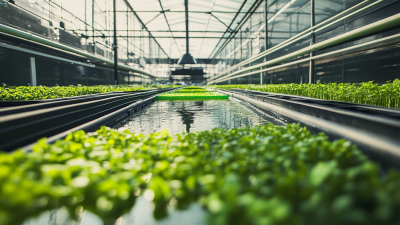
8 Innovative Strategies for the Best Aquaponics Greenhouse Success
-
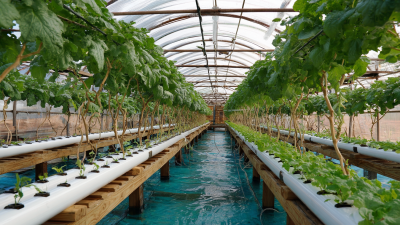
Unlocking the Advantages of the Best Aquaponics Greenhouse for Sustainable Farming Practices
-
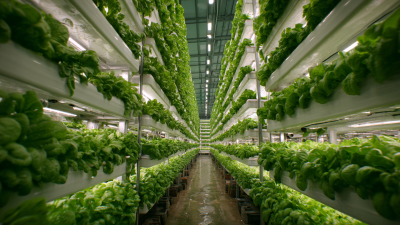
Leading the World in Aquaponics: Unveiling China's Best Export-Quality Systems
-
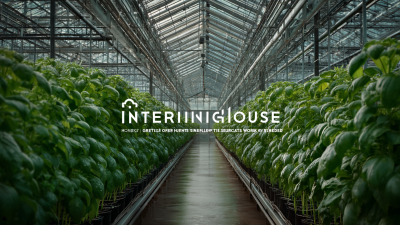
Finding Top Suppliers for the Best Intelligent Greenhouse Solutions Worldwide
-
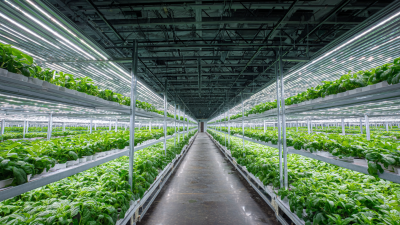
7 Reasons Why the Best Light Deprivation Greenhouse Will Transform Your Cultivation Business
-
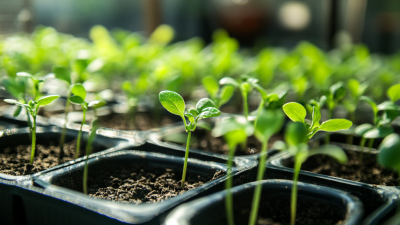
China’s Resilient Growth in Manufacturing: The Rise of the Best Blackout Greenhouses Amidst Tariff Challenges
